This article was written before James Earl Jones’s passing on September 9, 2024. I’m resharing it as an overview and celebration of his legendary career. May he rest in peace and may we all rise to the tasks he set forth.
Black Film Archive is a living register of Black films from 1898 to 1989. This Substack is its blog. Thank you for being here. Also: Join me in LA Feb 10 - 25, I’m guest programming a film series on tenderness in Black film at the Academy Museum. I hope to see you there.
"Do you, as a Black person, feel that you are able to use your career, your profession, only for so-called entertainment purposes? Are you not obligated as a Black person to use your career or profession as a way of affecting your environment? That's always been the challenge.” — James Earl Jones
James Earl Jones (b. January 17, 1931) is a son of Arkabutla, Mississippi —where he was born — and the steadings of Manistee, Michigan — where he was raised. Birthed to actor Robert Earl and tailor Ruth Jones, James Earl was reared by his maternal grandparents and crafted his worldview by caring for livestock and the stillness farmland offered.
James Earl developed a stutter as a young boy and was mute for a time. Largely preferring to communicate through the written word, James Earl found his voice in his teenage years with the help of writing and reading poetry. Hoping to further work through his ailment and with the support of his teachers, Jones joined the debate teams, where he swiftly became an award-winning orator. Debate paid his ticket to the University of Michigan (B.A. Drama, ‘55) after he won a public speaking contest with a scholarship.
“I think a stutterer ends up with a greater need to express himself, or perhaps, a greater awareness of the deep human need for expression. Being a mute or stutterer leaves you painfully aware of how you would like to say something.”
After discovering a photo of his absent father – Robert Earl, who rose to fame in early Black movies like Oscar Micheaux’s “Lying Lips” and Broadway – in Look Magazine, James Earl was certain his calling was to be an actor. Though his desires were against the wishes of the grandparents who raised him, James Earl eventually found his rightful destiny on the stage and screen.

After a slew of student and community theater plays, the mighty voice’s commitment to acting was fully formed while studying at the American Theatre Wing in New York City. While working as a janitor to support himself, Jones made his New York City stage debut in 1955 as Gregory in Romeo and Juliet and his Broadway debut in 1958 as Edward in Sunrise at Campobello1.
“Acting can never really be taught. It must be learned in a thousand ways, over and over again. Learning to act is ongoing, a lifelong process, and the responsibility rests with the actor. It does not rest with any teacher or director.”
Acting provided James Earl with a connection to the world he longed for and a reunion to the father he barely knew in his youth. The elder Jones — a black acting pioneer and a McCarthy-era blacklisted actor — introduced James Earl to Paul Robeson, an acting and philosophical inspiration that connected the two Jones men. The father and son also shared a deep reverence for Shakespeare’s Othello — a story centering on a stranger in a strange land whose life is warped by other people’s jealousy. The role of Othello is now considered James Earl’s signature.
“Aspirations can be even more haunting than achievements, more urgent than accomplishments. There is something to be said about fathers and sons standing looking out over the landscape of potential life, and one father saying to his son, "I did this; I did that; I traveled here, and there," and another father saying to his son, "I wanted to achieve this but I didn't…" Perhaps because Robert Earl aspired to play Othello and did not, I wanted even more urgently to do it, not to try to do it better than he could, but simply to do it.”
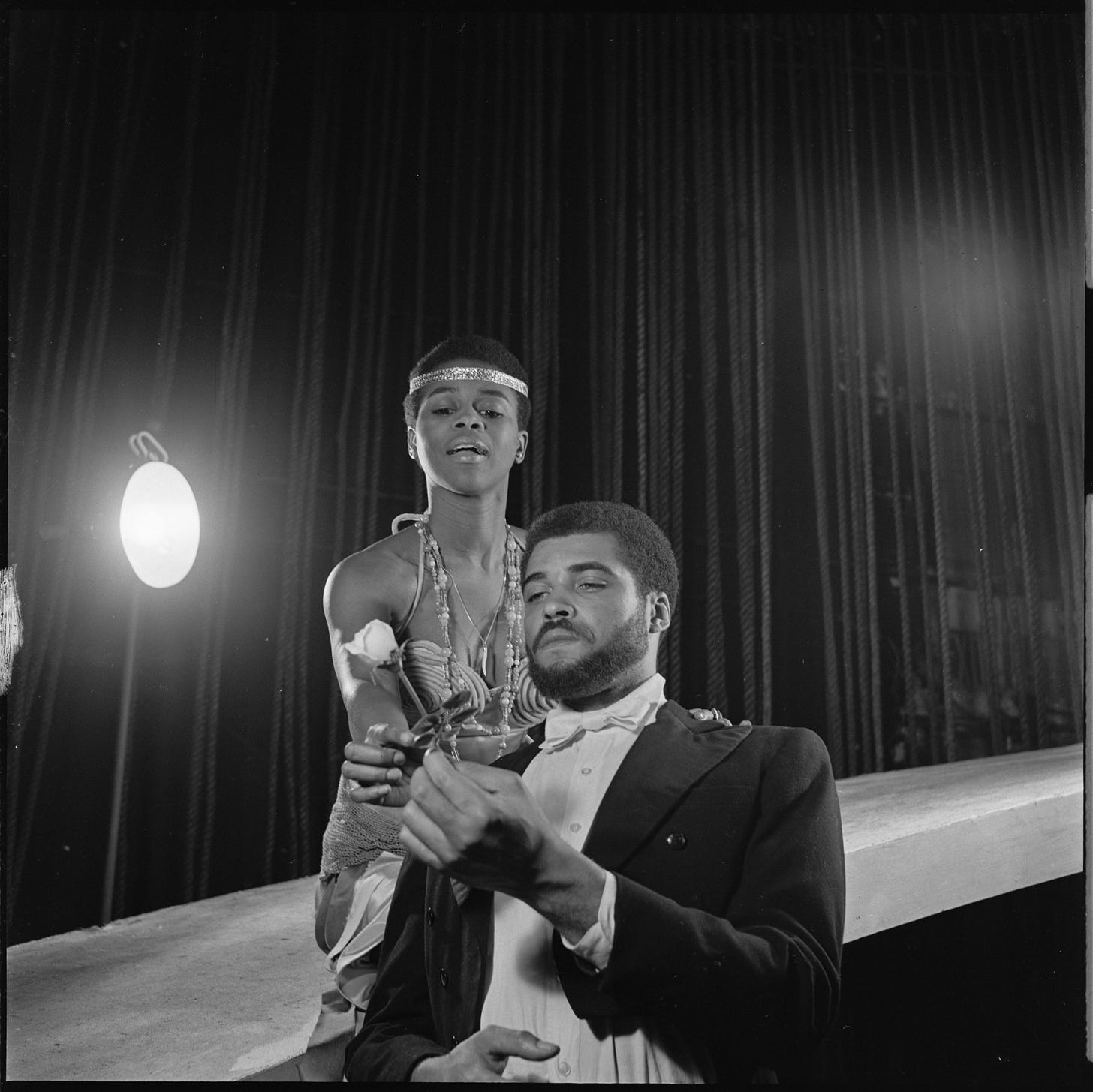
Throughout the 1960s, Jones starred in stageplays such as The Cool World (1960); Henry V (1960); The Pretender (1960, alongside his father); Of Mice and Men (1960, alongside his father); The Apple (1961); Othello (1963, 1964, Obie award; 1966, 1968, 1971, 1981, and 1982) Moon on a Rainbow Shawl (1962, alongside his father); and numerous others. He ended the 1960s with his Tony-award and Drama Desk-award-winning Broadway performance of the pioneering prizefighter Jack Jackson in The Great White Hope, 1968. By the end of the 1960s, the gifted artist cemented his legacy as one of the most celebrated talents on the American stage.2
On his stage performance in The Great White Hope, Newsweek’s Jack Kroll writes: “The play is Jones-in him all the juggling and over-deliberation of the work become fused and ignited in a figure at once larger than life and densely human. Jones has a great big technique without the slightest trace of emptiness or inflation. He can expand before your eyes from a fare point of inarticulate feeling to a storm system of emotion."
The critics lauded James Earl as an overnight success for his triumphant performance in The Great White Hope, but as all students of history know, there is no such thing. After 14 years on the stage, his acting career expanded after his Tony win. The champion of the stage also juggled becoming a champion of the screen. Jones had his screen debut in Stanley Kubrick's Dr. Strangelove. The newly minted screen actor also reprised his role as Jack Johnson in the adaptation of Great White Hope (1970). The film adaption garnered the actor another accolade: The Golden Globe Award for New Star of the Year3 alongside an Oscar nomination for Best Actor.
He followed up Great White Hope with The Man (1972) — a film about the first Black president of the United States who ascends to the position after those above him in the line of succession are killed. Written by Twilight Zone’s Rod Serling and based on the bestselling book of the same name, Paramount believed the made for TV film had the right stuff for a full theatrical release. In the age of the Blaxploitation and premiering on the heels of the earth-shifting Shaft (1971), 1972’s The Man read to audiences as a tame attempt to rewrite narrative when Blaxploitations provided landscape to act out Black desires.
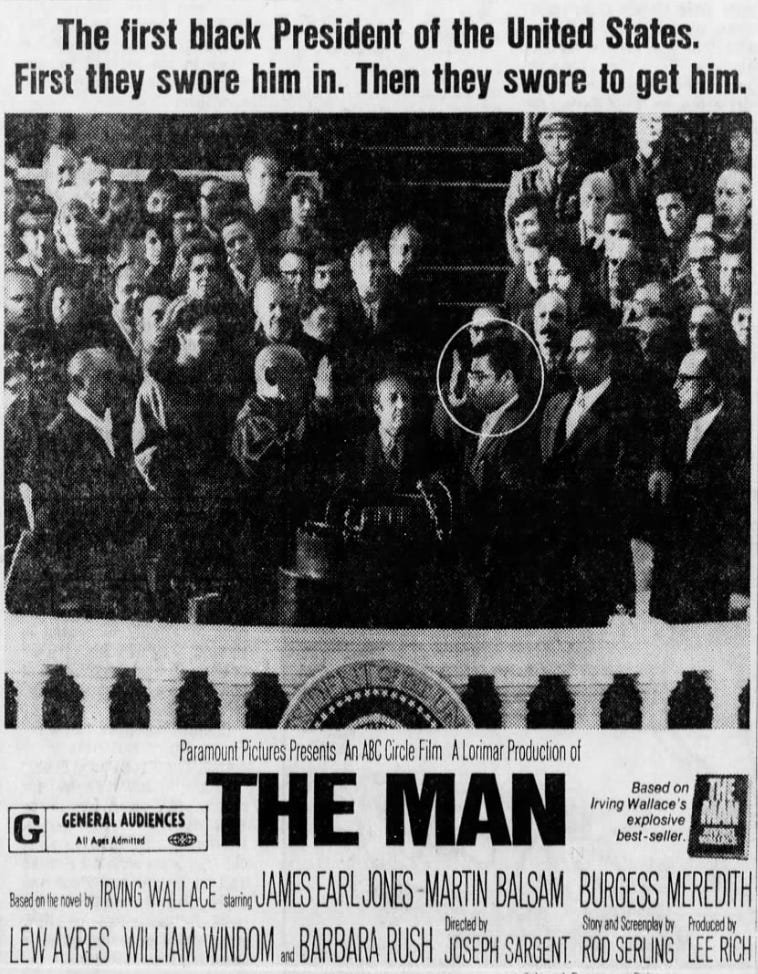
After The Man, came Claudine (1974). The film, co-starring Diahann Carroll, is an irresistible portrait of romance with something to say about love and loving in a world with impossible choices Black people must make. As Roop Marshall, James Earl sings a working man’s song.
In 1976, James Earl starred in The River Niger (1976), a film based on the play of the Tony-award winning play same name. The adaption reunited Earl Jones with The Blacks' Cecily Tyson. In the film, Jones is a poet living in Los Angeles's Watts trying to get by. 1976 also welcomed Jones's role in the baseball wonder The Bingo Long Traveling All-Stars & Motor Kings. In 1977, he co-starred in the Muhammad Ali biopic, The Greatest, as Malcolm X.
To many James’s rich, resonant voice —as showcased uncredited4 as Darth Vader in the Star Wars franchise— may be more famous than his full stage presence. His precious bounty of work as a voice actor, miraculous on its own, becomes even more miraculous when one remembers what he had to overcome to find his voice.
Like the assertive victories Jack Johnson faced in the ring, James Earl Jones's career is one of dominance in craft, skill, and virtue. His embodiments of Johnson repopularized the phrase great white hope which has come to mean the hope of the white race to regain dominance in a space where Black people are reigning. In his rich baritone and abundant grit, Jones reminds us all that work of the heart and mind is the greatest hope. Perseverance in action is having an unyielding commitment to your craft. May we all move to that tune.
Happy 92nd birthday to James Earl Jones!
P.S. - Eartha Kitt’s birthday was also this week. May I recommend viewing her unforgettable performance in Anna Lucasta (1958)?
This play debuted at the Cort Theatre, which was renamed to the James Earl Jones Theatre in 2022.
His pioneering presence on the stage was further cemented when he originated the role of Troy Maxson in August Wilson’s Fences (1985 - 1988, Tony award).
He is the only Black actor to win this accolade. Diana Ross won the award in 1972 for actress. This particular Golden Globe award concluded in 1983 for actor and actress.
James Earl attests it was his decision to not be credited in Star Wars. He’s credited in the rereleases of the film and in the original release Return of the Jedi (1983)




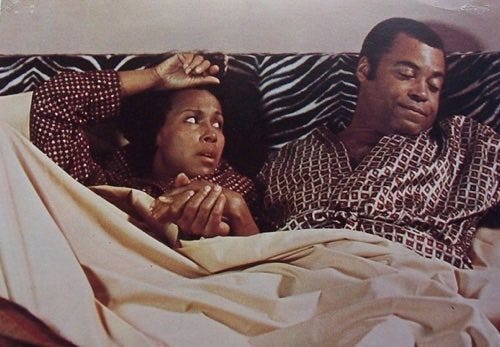
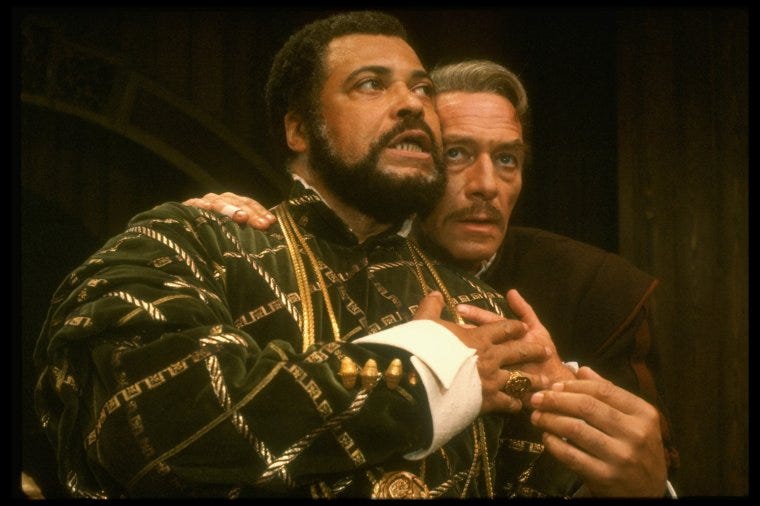
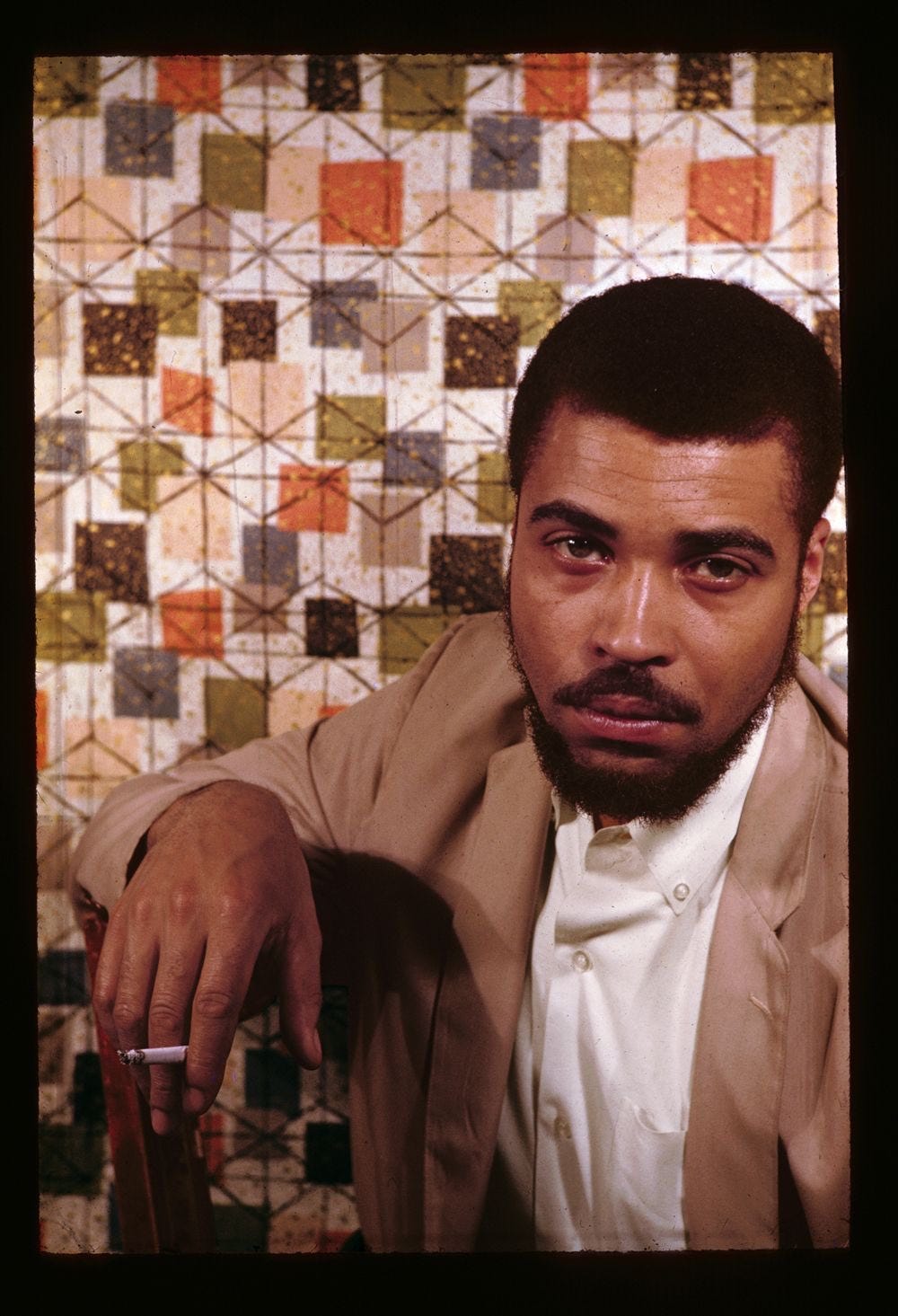
Thank u, Maya Cade! Thank u, Black Film Archive!
LOVE this piece, this article! Sooo well written! So articulate & extensive! So informative! And what better subject than the LEGENDARY, ICONIC, James Earl Jones?? So sad to see him go on a day that happens to be my birthday, but I still, & will ALWAYS celebrate him, & the many other GREAT & GRAND talents people of color have to look up to! Let's never forget the many who have overcome & paved ways & continue for future generations. I stand & applaud & bow! We're losing so many in the new millennium! So crazy, so sad, but they ALWAYS leave their eternal shining light!
This lil light o' mine, I'm gonna let it shine!
Ohhh!
R.I.P. Mr. JEJ..